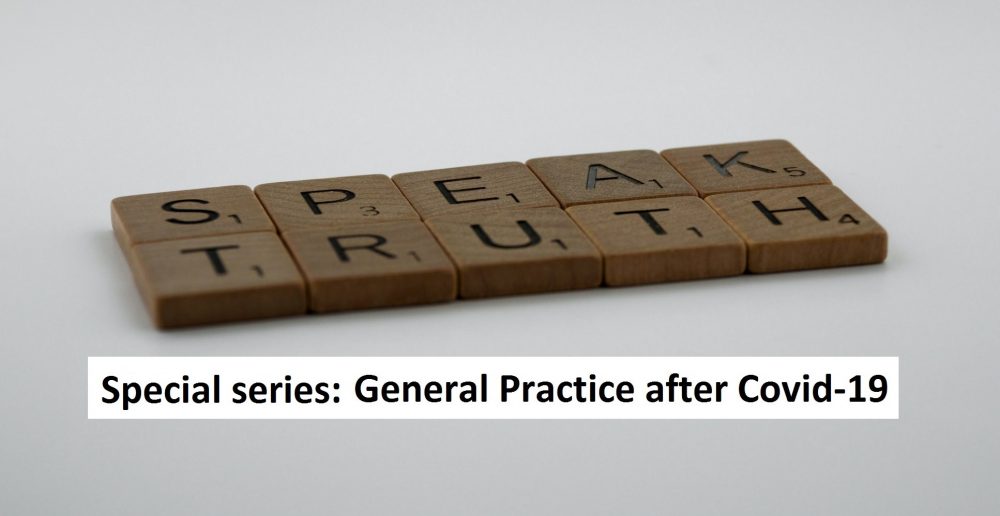 Judith Dawson is a GP in Kettering and clinical lead for the social care charity Leonard Cheshire
Judith Dawson is a GP in Kettering and clinical lead for the social care charity Leonard Cheshire
“Honesty – it’s such a waste of energy”, sings Paul Simon in his song Tenderness. There have certainly been times during the pandemic when this has appeared true, as if honesty in policy has been low on the agenda. Looking towards the future, we must hope that it isn’t going to be in such short supply as we examine the challenges facing primary care, the NHS and society.
Firstly, there needs to be a degree of truth and acceptance as to what we mean by “post-Covid”. Realistically the future is likely to be one of living with, rather than living after Covid, with all the implications that brings for continued behaviours to promote infection control and reduce viral transfer. Warnings from Dr Susan Hopkins have emphasised the need for continued mask wearing and infection control measures, as well as the prospect of further high rates of mortality and morbidity related to not only coronavirus but also other respiratory viruses.1 Vaccine hesitancy remains worryingly high, and without an adequate uptake we are unlikely to be able to resume primary care delivery in an unrestricted form, as the risk of cross infection in our premises will remain.
We are unlikely to be able to resume primary care delivery in an unrestricted form.
In terms of clinical practice, we are likely to experience a continued issue with access to some types of procedure, as well as the challenge of addressing the residual burden of occult illness that is likely to surface. Those gathering storm clouds of pent up patient demand get darker by the day, and I am sure that others are starting to sense the electrical crackles of anger and irritation from those who are aware of the restrictions on access. An honest and open discussion about resource utilisation and the balance of rights and responsibilities is sorely needed.
In Richard Hoggart’s 1957 work The Uses of Literacy,2 he describes the relationship between the doctor and the patient in the area that he studied: “Most doctors … know that there is little they can do. Their middle-aged…patients look after themselves badly, work too long or too hard, do not know how to relax, take insufficient sleep and have a badly balanced diet”. Compare this with “Radical Help”,3 Hilary Cottam’s recent book on reform of the welfare state, describing a typical patient as “anxious,…can’t sleep…depressed, her back aches, her feet are painful, her weight has crept up and up”.
For too long we have accepted, perhaps even encouraged, a situation in which clinicians are seen as resolving health problems on behalf of patients. While this may be technically true in some instances, unless our actions are matched by individual and societal commitments to healthy lifestyles, medical intervention will be ineffectual at solving their problems. Resetting the expectations of what we can, and indeed should offer will require a concerted approach across a health service suffering from strong divisions between primary and secondary care.4 I would advocate an honest approach from the professional colleges to increase understanding in both directions between hospital and primary care.
An honest and open discussion about resource utilisation and the balance of rights and responsibilities is sorely needed.
There also needs to be greater frankness about the limits of medical ability, as clearly demonstrated in the debate with regards to CPR and coronavirus. This has been revisited multiple times, and issues regarding the likely success of medical intervention have been conflated with concepts about the value of life. The moral injury that results from ineffectual resuscitation attempts is significant.5 As a society we need a more honest approach to the end of life and the statistical likelihood of success of CPR.6 This requires a level of communication skill which is difficult to attain and maintain without regular practice and review, and we need to accept the requirement for lifelong learning in this area.
Honesty also implies a degree of self-scrutiny and humility, and for all clinicians, we need to be open to looking after ourselves. Unless we place appropriate and honest boundaries, a clinical career may consume and destroy every ounce of energy. The government, which has supported the inappropriate heroic narrative regarding self-sacrifice from clinicians, is unlikely to help maintain the front line in the future. This is evidenced by recent budgetary choices on NHS funding and a lack of attention to the economic capital of a healthy workforce. GMC guidance requires clinicians to act openly, honestly and with integrity. I would argue that, post-Covid, politicians and the public have a duty of care to act in the same way .
- BBC News: Covid: UK must prepare for ‘hard winter of flu’ https://www.bbc.co.uk/news/uk-56312621
- Hoggart, R The Uses of Literacy 1957, Chatto and Windus: London, p47
- Cottam,H, Radical Help: How we can remake the relationships between us and revolutionise the welfare state 2018,Virago Press: London, p138
- Oliver,D We can support primary care without blaming hospital doctors BMJ 2021;372:n502
- Druwé P,et al.; REAPPROPRIATE study group. Impact of perceived inappropiate cardiopulmonary resuscitation on emergency clinicians’ intention to leave the job: Results from a cross-sectional survey in 288 centres across 24 countries. Resuscitation. 2021 Jan;158:41-48.
- Pitcher et al,Emergency care and resuscitation plans, BMJ 2017;356:j876
Featured photo by Brett Jordan on Unsplash






